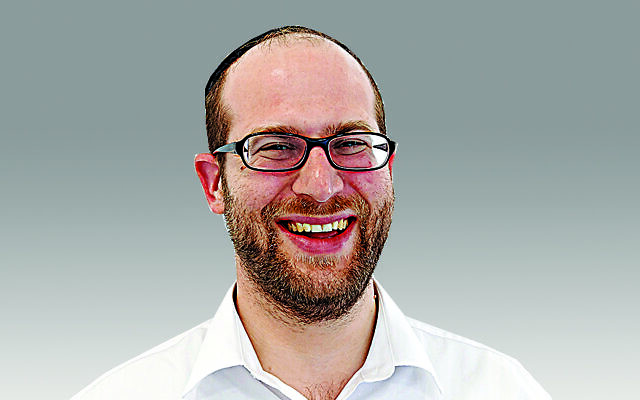Making sense of the Sedra when it says to stop work for the seventh year
Leaders relate the week’s parsha to a gap year, in our series. This week, Jonny Roodyn, educational director of Jewish Futures and rabbi of Finchley Central Federation Synagogue
On erev Rosh Hashanah last year, I received a powerful clip of a group of farmers from Kibbutz Shaalvim in central Israel.
This was the last day of the Jewish year and they were about to stop work – for the entire year!
They downed tools, stopped their tractors and then the music started playing and they broke out into a joyous dance to the words from the Rosh Hashanah prayers, simcha le artzecha ve sasson le irecha – gladness to your land and joy to your city.
The sight of them rejoicing at the opportunity to observe the laws of shmita brought me to tears.
The laws of shmita are outlined in this week’s sedra, Behar. “Six years you shall sow your field and six years you shall prune your vineyard and gather in the land’s produce. But in the seventh year there shall be a Sabbath, observed by the cessation from work for the land, a Sabbath to God; you shall not sow your
fi eld nor prune your vineyard” (Vayikra 25:3–4).
The practicalities of how this plays out in contemporary Israel are complex and sparked a huge Halachic controversy at the end of the 19th century. As more and more Jews started to return to Zion, many of them formed agricultural communities that then became moshavim and kibbutzim. Conditions were extremely difficult and the whole enterprise was highly precarious; therefore the prospect of stopping work for an entire year could have placed entire communities in danger.
As such, some Halachic authorities devised a mechanism known as the heter mechira, which functions in a manner similar to the sale of chametz before Pesach.
On the other side, there were great rabbis who opposed this vehemently.
This is an issue that rears its head every seven years, as there are major Halachic and economic implications for shmita observance, or reliance on this leniency.
Even those who propose relying on the heter mechira only do so because they believe that the extenuating circumstances that were relevant at the start of mass Jewish settlement of the land of Israel are still relevant, and perhaps even more so.
This does not detract from the importance of shmita and the lesson it teaches us. The idea of resting for a year is explained by Rabbi Samson Raphael Hirsch as being distinct from the weekly Shabbat with which we are more familiar.
On Shabbat, we desist from acts of creation in order to remember God as the creator.
Shmita, on the other hand, gives us an opportunity to take this further and recognise God as the master of the land. By leaving our land fallow and declaring the fruits ownerless, we let go and demonstrate that we live in the land through Hashem’s grace and not as a result of our own prowess.
This idea is all the more pertinent for generations who have witnessed the rebuilding of the land of Israel, something that is a modern-day miracle. The fact that we have returned to Zion and continue to flourish there, despite the many challenges to Israel’s existence, is certainly something to celebrate this shmita year.

Thank you for helping to make Jewish News the leading source of news and opinion for the UK Jewish community. Today we're asking for your invaluable help to continue putting our community first in everything we do.
For as little as £5 a month you can help sustain the vital work we do in celebrating and standing up for Jewish life in Britain.
Jewish News holds our community together and keeps us connected. Like a synagogue, it’s where people turn to feel part of something bigger. It also proudly shows the rest of Britain the vibrancy and rich culture of modern Jewish life.
You can make a quick and easy one-off or monthly contribution of £5, £10, £20 or any other sum you’re comfortable with.
100% of your donation will help us continue celebrating our community, in all its dynamic diversity...
Engaging
Being a community platform means so much more than producing a newspaper and website. One of our proudest roles is media partnering with our invaluable charities to amplify the outstanding work they do to help us all.
Celebrating
There’s no shortage of oys in the world but Jewish News takes every opportunity to celebrate the joys too, through projects like Night of Heroes, 40 Under 40 and other compelling countdowns that make the community kvell with pride.
Pioneering
In the first collaboration between media outlets from different faiths, Jewish News worked with British Muslim TV and Church Times to produce a list of young activists leading the way on interfaith understanding.
Campaigning
Royal Mail issued a stamp honouring Holocaust hero Sir Nicholas Winton after a Jewish News campaign attracted more than 100,000 backers. Jewish Newsalso produces special editions of the paper highlighting pressing issues including mental health and Holocaust remembrance.
Easy access
In an age when news is readily accessible, Jewish News provides high-quality content free online and offline, removing any financial barriers to connecting people.
Voice of our community to wider society
The Jewish News team regularly appears on TV, radio and on the pages of the national press to comment on stories about the Jewish community. Easy access to the paper on the streets of London also means Jewish News provides an invaluable window into the community for the country at large.
We hope you agree all this is worth preserving.






















